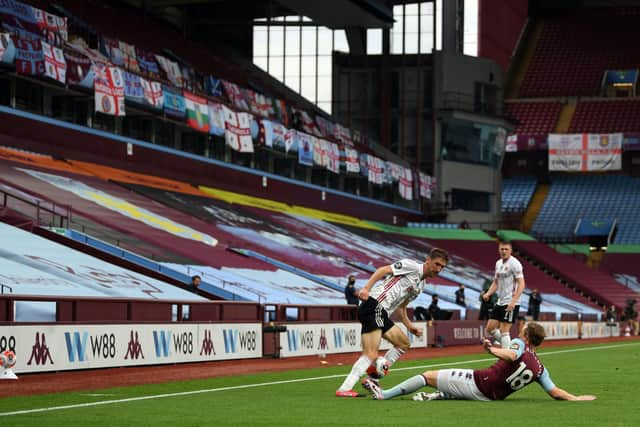Financial experts Deloitte predict 'bounce-back' after Premier League revenues drop for first time
Deloitte's 30th Annual Review of Football Finance revealed that across European football revenues dropped by £3.4bn in 2019-20, the season delayed after the game was effectively locked down for three months in England, and abandoned altogether in some leagues.
The "big five" European leagues - England, Spain, Germany, Italy and France - contracted by 13 per cent to revenues of £22.1bn.
Advertisement
Hide AdAdvertisement
Hide AdPremier League clubs' revenue fell to £4.5bn from a record £5.2bn the previous season but they were slightly cushioned by the lack of end-of-season matchday revenue, broadcast rebate and delay of some television income by the last nine or 10 league matches per club going behind closed doors by the smallest increase in wage costs since 2004-05, up four per cent to £3.3bn.


It was the first time in Premier League history revenues dropped.
Sheffield United were Yorkshire's only Premier League representatives that season but Barnsley, Huddersfield Town, Hull City, Middlesbrough and Sheffield Wednesday were playing in the Championship, which saw aggregate wages-to-revenue ratio grow from an already alarming 107 per cent the previous season to 120 per cent - ie for every £1 of income brought in by the club, £1.20 was spent on wages. UEFA recommends the ratio should not be above 70 per cent.
The three Football League divisions reported a combined 13 per cent reduction in revenues to £943m.
Advertisement
Hide AdAdvertisement
Hide AdWith last season played almost entirely behind closed doors, Football League clubs are struggling to balance the books but so far none have gone out of business. Europe's most high-profile problems have come at Barcelona, hundreds of millions of euros in debt. Worldwide spending in this year's transfer windows has been notably more restrained in 2021.
Dan Jones of Deloitte's sports business group thinks the recovery is already underway, and the shock to the system might serve clubs well in the long run.
"Obviously this time last year we were not expecting the whole season would be played behind closed doors - I don't think anyone was envisaging that," he said.
"We think for 2020-21, it will be a bounce-back, but we don't think it will be quite getting back to the highs of 2018-19.
Advertisement
Hide AdAdvertisement
Hide Ad"Then for the 2021-22 season coming up, it looks like there will be no restrictions (on supporters at grounds), so it will probably be a record year."
If the restraint currently being shown with regard to wages continues as finances pick up, Jones believes football will be stronger for it.
"You could actually see clubs, after an extremely nasty financial shock over the past 18 months, kind of come out of this in a stronger position for the future because you have managed to put the breaks on that wage inflation," he said.
"The resilience clubs have shown so far, if they can build on that they can make themselves much more sustainable than they probably looked 18 months ago.
Advertisement
Hide AdAdvertisement
Hide Ad"The support and passion is clearly out there for clubs at all levels in this country, so if that means we get to a more sustainable position from here on, then that would be a good outcome."
Support The Yorkshire Post and become a subscriber today. Your subscription will help us to continue to bring quality news to the people of Yorkshire. In return, you'll see fewer ads on site, get free access to our app and receive exclusive members-only offers. Click HERE to subscribe.
Comment Guidelines
National World encourages reader discussion on our stories. User feedback, insights and back-and-forth exchanges add a rich layer of context to reporting. Please review our Community Guidelines before commenting.